- Home
- Karen Marie Moning
Darkfever_The Fever Series Page 4
Darkfever_The Fever Series Read online
Page 4
The first floor had freestanding shelves arranged in wide aisles to my left, two seating cozies, and a cashier station to my right. I couldn’t see what stretched beyond the rear balcony on the upper floors but I guessed more books and perhaps some of those baubles the sign mentioned.
There wasn’t a soul in sight.
“Hello!” I called, spinning in a circle, drinking it in. A bookstore like this was a fabulous find, a great end to an otherwise awful day. While I waited for my taxi, I’d browse for new reads. “Hello, is anyone here?”
“Be with you in a trice, dear,” a woman’s voice floated from the rear of the store.
I heard the soft murmur of voices, a woman’s and a man’s, then heels clacking across a hardwood floor.
The full-bosomed, elegant woman who came into view had once been stunning in the way of movie-star divas of old. In her early fifties now, her sleek dark hair was gathered back in a chignon from a pale-skinned, classic-boned face. Though time and gravity had traced the supple skin of youth with the lines of fine parchment and creased her brow, this woman would always be beautiful, right up to the day she died. She wore a long tailored gray skirt and a gauzy linen blouse that flattered her voluptuous figure and revealed a hint of a lacy bra beneath. Lustrous pearls glowed softly at her neck, wrist, and ears. “I’m Fiona. Is there something I can help you find, dear?”
“I was hoping I could use your phone to call a taxi. Of course, I’ll buy something too,” I added hastily. Many of the local businesses posted placards advising that phones and bathrooms were only for paying customers.
She smiled. “No need for that, dear, unless you wish. Certainly, you may use our phone.”
After paging through the phone book and dialing up a cab, I set off to make good use of my twenty-minute wait, collecting two thrillers, the latest Janet Evanovich, and a fashion magazine. While Fiona was ringing me up, I decided to try a stab in the dark, figuring anyone who worked with so many books surely knew a little of something about a lot of everything.
“I’ve been trying to find out what a word means but I’m not sure what language it’s in, or even if I’m saying it right,” I told her.
She scanned the last of my books and told me the total. “What word would that be, dear?”
I glanced down, rummaging in my purse for my credit card. Books weren’t in my budget and I was going to have to float them until I got back home. “Shi-sadu. At least that’s what I think it is.” I found my wallet, withdrew my Visa, and glanced up at her again. She’d gone still and looked white as a ghost.
“I’ve never heard of it. Why are you looking for it?” she said tightly.
I blinked. “Who said I was looking for it?” I hadn’t said I was looking for it. I’d just asked what the word meant.
“Why else would you be asking?”
“I just wanted to know what it means,” I said.
“Where did you hear of it?”
“Why do you care?” I knew I’d started to sound defensive, but really, what was her deal? The word obviously meant something to her. Why wouldn’t she tell me? “Look, this is really important.”
“How important?” she said.
What did she want? Money? That could be a problem. “Very.”
She looked beyond me, over my shoulder, and uttered a single word like a benediction. “Jericho.”
“Jericho?” I echoed, not following. “You mean the ancient city?”
“Jericho Barrons,” a rich, cultured male voice said behind me. “And you are?” Not an Irish accent. No idea what kind of accent it was, though.
I turned, with my name perched on the tip of my tongue, but it didn’t make it out. No wonder Fiona had said his name like that. I gave myself a brisk inward shake and stuck out my hand. “MacKayla, but most people call me Mac.”
“Have you a surname, MacKayla?” He pressed my knuckles briefly to his lips and released my hand. My skin tingled where his mouth had been.
Was it my imagination or was his gaze predatory? I was afraid I was getting a little paranoid. It had been a long, odd day after an odder night. Ashford Journal headlines were beginning to form in my mind: Second Lane Sister Meets with Foul Play in Dublin Bookshop. “Just Mac is fine,” I evaded.
“And what do you know of this shi-sadu, just Mac?”
“Nothing. That’s why I was asking. What is it?”
“I have no idea,” he said. “Where did you hear of it?”
“Can’t remember. Why do you care?”
He crossed his arms.
I crossed mine too. Why were these people lying to me? What in the world was this thing I was asking about?
He studied me with his predator’s gaze, assessing me from head to toe. I studied him back. He didn’t just occupy space; he saturated it. The room had been full of books before, now it was full of him. About thirty, six foot two or three, he had dark hair, golden skin, and dark eyes. His features were strong, chiseled. I couldn’t pinpoint his nationality any more than I could his accent; some kind of European crossed with Old World Mediterranean or maybe an ancestor with dark Gypsy blood. He wore an elegant, dark gray Italian suit, a crisp white shirt, and a muted patterned tie. He wasn’t handsome. That was too calm a word. He was intensely masculine. He was sexual. He attracted. There was an omnipresent carnality about him, in his dark eyes, in his full mouth, in the way he stood. He was the kind of man I wouldn’t flirt with in a million years.
A smile curved his mouth. It looked no nicer than he did, and I wasn’t deluded by it for a moment.
“You know what it means,” I told him. “Why don’t you just tell me?”
“You know something about it, as well,” he said. “Why not tell me?”
“I asked first.” Childish maybe, but it was all I could think of. He didn’t dignify it with a response. “I’ll find out what I want to know one way or another,” I said. If these people knew what it was, somewhere in Dublin somebody else did, too.
“As will I. Have no doubt of that, just Mac.”
I gave him my frostiest look, much-practiced on drunk, randy patrons at The Brickyard. “Is that a threat?”
He stepped forward and I stiffened, but he merely reached past me, over my shoulder. When he moved back, he was holding my credit card. “Of course not”—he glanced down at my name—“Ms. Lane. I see your Visa is drawn on SunTrust. Isn’t that a southern U.S. bank?”
“Maybe.” I snatched my card from his hand.
“What state in the South are you from?”
“Texas,” I lied.
“Indeed. What brings you to Dublin?”
“None of your business.”
“It became my business when you came into my establishment, inquiring about the shi-sadu.”
“So you do know what it is! You just admitted it.”
“I admit nothing. However, I will tell you this: You, Ms. Lane, are in way over your head. Take my advice and extricate yourself while it’s still possible.”
“It’s too late. I can’t.” His condescending high-handedness was making me mad. When I get mad, I dig my heels in right where I am.
“A pity. You won’t last a week as sophomorically as you’re bludgeoning about. Should you care to tell me what you know, I might be able to increase your odds of survival.”
“Not a chance. Not unless you tell me what you know first.”
He made an impatient sound and his eyes narrowed. “You bloody fool, you have no idea what you’re—“
“Somebody in here call a cab?” The bells on the door jangled.
“I did,” I shot over my shoulder.
Jericho Barrons actually made the faint beginnings of a lunge toward me, as if to physically restrain me. Until that moment, although aggression had charged the air and threat had been implied, there’d been nothing overt. I’d been aggravated, now I was a little afraid.
Our gazes locked and we stood a moment in that frozen tableau. I could almost see him calculating the importance—if any at all—of
our sudden audience.
Then he gave me a faint sardonic smile and inclined his head as if to say, You win this time, Ms. Lane. “Don’t count on it twice,” he murmured.
Saved by the bell, I snatched up my bag of books and backed away. I didn’t take my eyes off Jericho Barrons until I was out the door.
FOUR
Communal bathrooms sucked.
I got my hot soup, but my shower was icy. Upon returning to The Clarin House, I made the unhappy discovery that apparently everyone in the inn waited until early evening to shower before going out for dinner and a night on the town. Inconsiderate tourists. The water was far too cold to endure washing my hair, so I phoned the desk for a six o’clock wakeup call when I would try again. I suspected some of the guests would just be getting in then.
I changed out of street clothes into a lacy peach sleep shirt and matching panties. That was another pain about communal bathrooms—you either got fully dressed again after your shower or risked a half-naked mad dash down the hall past dozens of doors that might pop open at any moment. I’d opted for fully dressed.
I finished unpacking the last of my luggage. I’d brought a few comfort items from home. I pulled out one of Alina’s peaches-and-cream candles, two Hershey bars, my favorite pair of faded and much-loved cutoff jean shorts that Mom was always threatening to throw away, and a small framed picture of my folks, which I propped against the lamp on the dresser.
Then I rummaged through my backpack and dug out the notebook I’d bought a few weeks ago, and sat cross-legged on my bed. Alina had always kept a journal, ever since we were kids. As a bratty younger sibling, I’d ferreted out many of her hiding places—she’d gotten more inventive as the years had gone by; the last I’d found had been behind a loose baseboard in her closet—and teased her mercilessly about whatever boyfriend she’d been mooning over, complete with annoying kissy-kissy sounds.
Until recently, I’d never written in one myself. After the funeral, I’d been in desperate need of an outlet and had poured out pages of grief into the thing. More recently I’d been writing lists: what to pack, what to buy, what to learn, and where to go first. Lists had become my anchors. They got me through the days. The oblivion of sleep got me through the nights. So long as I knew exactly where I was going and what I was doing the next day, I didn’t flounder.
I was proud of myself for how well I’d blustered through my first full day in Dublin. But then, when bluster was all you had, it wasn’t so hard to paste it on over your real face. I knew what I really was: a pretty young woman barely old enough to tend bar, who’d never been more than a few states away from Georgia, who’d recently lost her sister and who was—as Jericho Barrons had said—in way over her head.
Go to Trinity College, talk to her professors and try to find out names of friends was number one on my list for tomorrow. I had an e-mail copy of her class schedule, listing instructors and times. She’d sent it to me at the beginning of the term so I’d know when she was in class and when my odds were best of catching her at home to talk. With luck, someone I spoke to tomorrow would know who Alina had been seeing and be able to tell me who her mystery man was. Go to local library, keep trying to track down shi-sadu was next. I sure wasn’t going back to that bookstore, which really pissed me off because it had been an amazing bookstore. I couldn’t shake the feeling I’d been lucky to escape today. That if the cabbie hadn’t arrived at just that moment, Jericho Barrons might have tied me to a chair and tortured me until I’d told him everything he wanted to know. Buy boxes, bags, and broom to take to Alina’s place was third. That one was optional. I wasn’t sure I was ready to go back there yet. I nibbled the tip of my pen, wishing I’d been able to see Inspector O’Duffy. I’d been hoping to get his reports and retrace whatever route the Gardai investigation had followed. Unfortunately, that possibility was now on hold for a few days.
I made a short list of things I wanted from a local drugstore: an adaptor to charge my iPod; juice; and a few cheap snacks to keep in my room, then turned out the light and fell almost immediately into a deep, dreamless sleep.
Someone knocking at my door awakened me.
I sat up, rubbing gritty, tired eyes that felt as if I’d just shut them seconds ago. It took me a few moments to remember where I was—in a twin bed in a chilly room in Dublin, with rain tapping lightly at the window.
I’d been having a fantastic dream. Alina and I were playing volleyball up at one of the many man-made lakes built by Georgia Power, scattered throughout the state. There were three near Ashford and we went to one or the other just about every weekend in the summer for fun, sun, and guy-watching. The dream had been so vivid I could still taste Corona with lime, smell coconut suntan oil, and feel the silk of trucked-in sand beneath my feet.
I glanced at my watch. It was two o’clock in the morning. I was sleepy and grumpy and didn’t try to disguise it. “Who is it?”
“Jericho Barrons.”
I couldn’t have been slammed awake any harder if I’d been hit upside the head with my mom’s cast-iron frying pan. What was he doing here? How had he found me? I shot up, my hand hovering over the phone, ready at any moment to call the front desk and ask for the police. “What do you want?”
“We have information to exchange. You want to know what it is. I want to know what you know about it.”
I wasn’t about to reveal how freaked out I was that he’d hunted me down. “Bright guy, aren’t you? I figured that out back at the store. What took you so long?”
There was such a protracted silence that I began to wonder if he’d gone away. “I am unaccustomed to asking for what I want. Nor am I accustomed to bartering with a woman,” he said finally.
“Well, get used to it with me, bud, because I don’t take orders from anyone. And I don’t give up anything for free.” Bluster, bluster, bluster, Mac. But he didn’t know that.
“Do you intend to open this door, Ms. Lane, or shall we converse where anyone might attend our business?”
“Do you really intend to exchange information?” I countered.
“I do.”
“And you’ll go first?”
“I will.”
My shoulders slumped. I moved my hand away from the phone. I straightened my shoulders again quickly. I knew the value of putting a smile on a sad face—it made you feel happy after a while. Courage was no different. I didn’t trust Jericho Barrons farther than I could throw him, which was a great big Not At All, but he knew what this shi-sadu was, and although I hoped I could find the information somewhere else, what if I couldn’t? What if I wasted weeks looking with no success? Time was money and mine was finite. If he was willing to trade, I had to open that door. Unless … “We can trade through the door,” I said.
“No.”
“Why not?”
“I am a private person, Ms. Lane. This is not negotiable.”
“But I—”
“No.”
I blew out an aggravated breath. The tone in his voice said it would be a waste of time to argue. I stood and reached for a pair of jeans. “How did you find me?” I buttoned my fly and pushed my hands into my hair. It always got tangled when I slept because it was so long. I had major bed-head.
“You procured a hired conveyance at my establishment.”
“We call them taxis where I come from. And bookstores.” God, he was stuffy.
“We call them manners where I come from, Ms. Lane. Have you any?”
“You should talk. It’s not my fault. Being threatened seems to bring out the worst in me.” I opened the door a crack and glared up at him through the space afforded by the latch-chain. I couldn’t imagine Jericho Barrons as a child, going to school, face freshly scrubbed, hair neatly combed, lunch box in hand. He’d surely been spawned by some cataclysmic event of nature, not born.
He cocked his head and studied me through the narrow opening, spending several seconds on each part of me: disheveled hair, sleep-swollen mouth and eyes, lacy sleep shirt, jeans, toes. I felt
as if I’d been burned to CD by the time he was done. “May I come in?” he said.
“I wouldn’t have let you up this far.” I was furious the desk clerk had let him up. I’d thought the place had better security. I was going to have a word with the manager tomorrow.
“I told them I was your brother.” He gleaned my thoughts from my face.
“Right. Because we look so much alike.” If he was winter, I was summer. If I was sunshine, he was night. A dark and stormy one.
Not an ounce of amusement flickered in those dark eyes. “Well, Ms. Lane?”
“I’m thinking.” Now that he knew where I was staying, if he wanted to harm me, he could do it anytime. No need to rush into it tonight. He could lie in wait for me and jump me somewhere tomorrow in the streets. I would be no safer in the future than I was from him now, unless I was willing to move about from inn to inn, trying to lose him, and I wasn’t. I needed to be in this part of town. Besides, he just didn’t look like the kind of creep that would messily murder a woman in her hotel room; he looked like the kind of creep that would line her up in the sights of an assassin’s rifle without a shred of emotion. That I would use that as an argument in his favor should have worried me. Later I would realize I’d been walking around still more than a little numb from Alina’s death during those first weeks in Ireland, and more than a little reckless from it as well. I sighed. “Sure. Come in.”
I closed the door, unhooked the chain, opened it again, then stepped back, allowing him to enter. I pushed the door open all the way and left it flush to the wall, so anyone walking past could see in and, if I needed to, I could shout down the third floor with my cries for help. Adrenaline was pumping through my body, making me feel shaky. He was still wearing his impeccable Italian suit, his shirt just as crisp and white as it had been hours ago. The cramped room was suddenly stuffed to overflowing with Jericho Barrons. If a normal person filled one hundred percent of the molecules they occupied, he somehow managed to cram his to two hundred percent capacity.

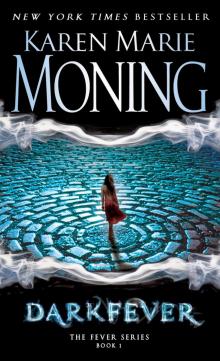 Darkfever
Darkfever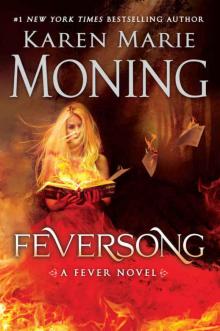 Feversong
Feversong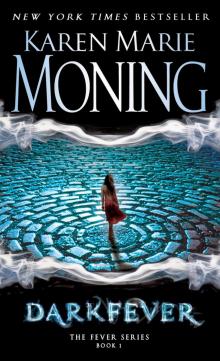 Faefever
Faefever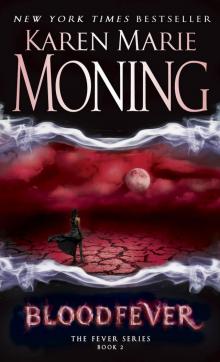 Bloodfever
Bloodfever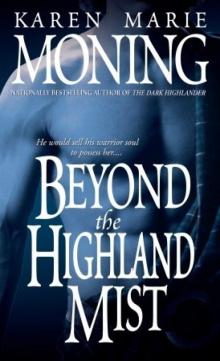 Beyond the Highland Mist
Beyond the Highland Mist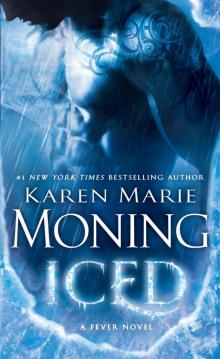 Iced
Iced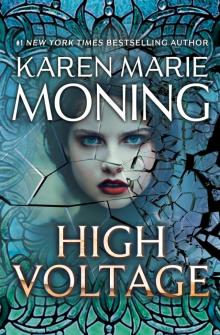 High Voltage
High Voltage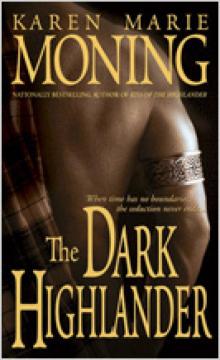 The Dark Highlander
The Dark Highlander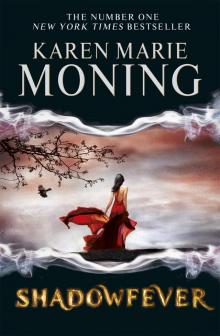 Shadowfever
Shadowfever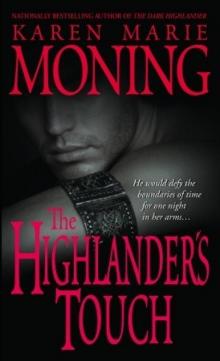 The Highlander's Touch
The Highlander's Touch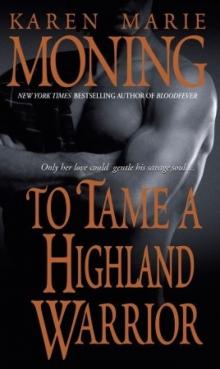 To Tame a Highland Warrior
To Tame a Highland Warrior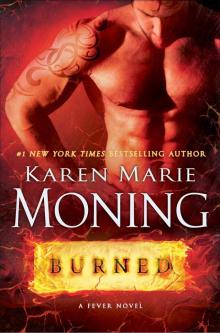 Burned
Burned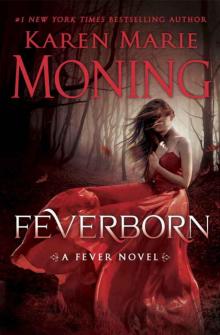 Feverborn
Feverborn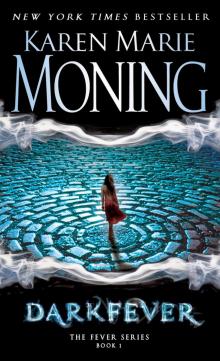 Dreamfever
Dreamfever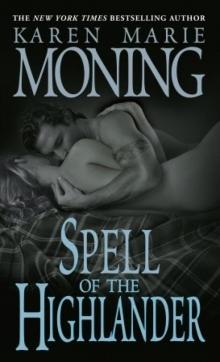 Spell of the Highlander
Spell of the Highlander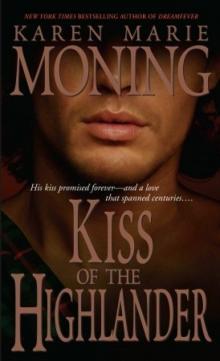 Kiss of the Highlander
Kiss of the Highlander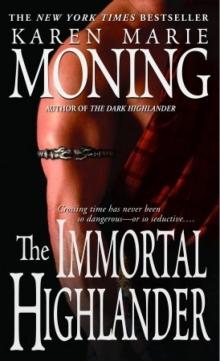 The Immortal Highlander
The Immortal Highlander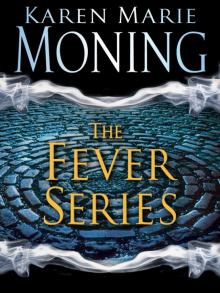 Karen Marie Moning’s Fever Series 5-Book Bundle: Darkfever, Bloodfever, Faefever, Dreamfever, Shadowfever
Karen Marie Moning’s Fever Series 5-Book Bundle: Darkfever, Bloodfever, Faefever, Dreamfever, Shadowfever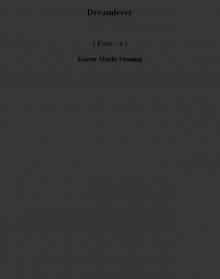 Dreamfever f-4
Dreamfever f-4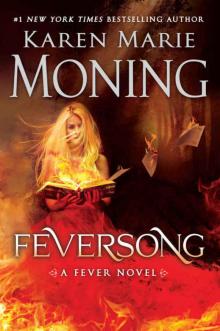 Feversong: A Fever Novel
Feversong: A Fever Novel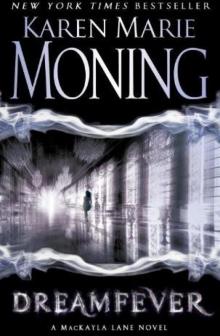 Dreamfever_The Fever Series
Dreamfever_The Fever Series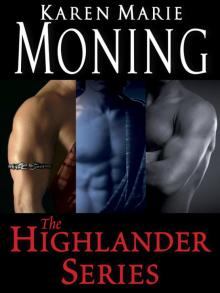 The Highlander Series 7-Book Bundle
The Highlander Series 7-Book Bundle![[Highlander 04] - Kiss of the Highlander Read online](http://i1.bookreadfree.com/i1/03/29/highlander_04_-_kiss_of_the_highlander_preview.jpg) [Highlander 04] - Kiss of the Highlander
[Highlander 04] - Kiss of the Highlander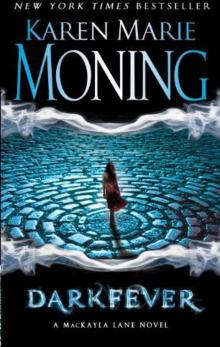 Darkfever_The Fever Series
Darkfever_The Fever Series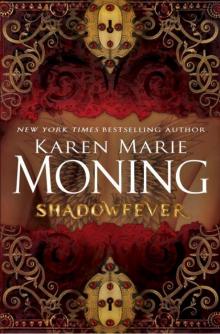 Shadowfever_Fever
Shadowfever_Fever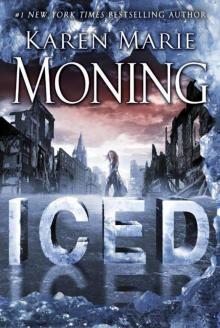 Iced: A Dani O'Malley Novel (Fever Series)
Iced: A Dani O'Malley Novel (Fever Series)![Fever [08] Feverborn Read online](http://i1.bookreadfree.com/i2/04/09/fever_08_feverborn_preview.jpg) Fever [08] Feverborn
Fever [08] Feverborn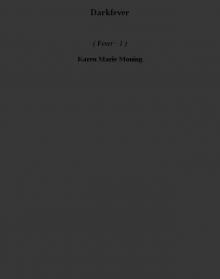 Darkfever f-1
Darkfever f-1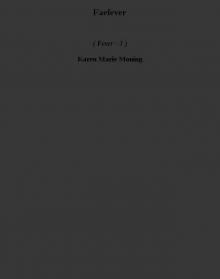 Faefever f-3
Faefever f-3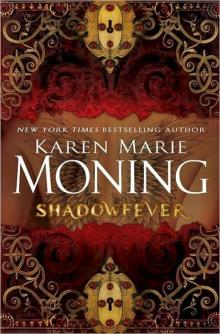 Shadowfever f-5
Shadowfever f-5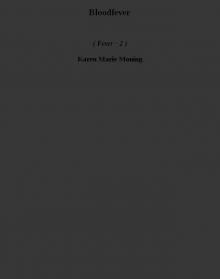 Bloodfever f-2
Bloodfever f-2